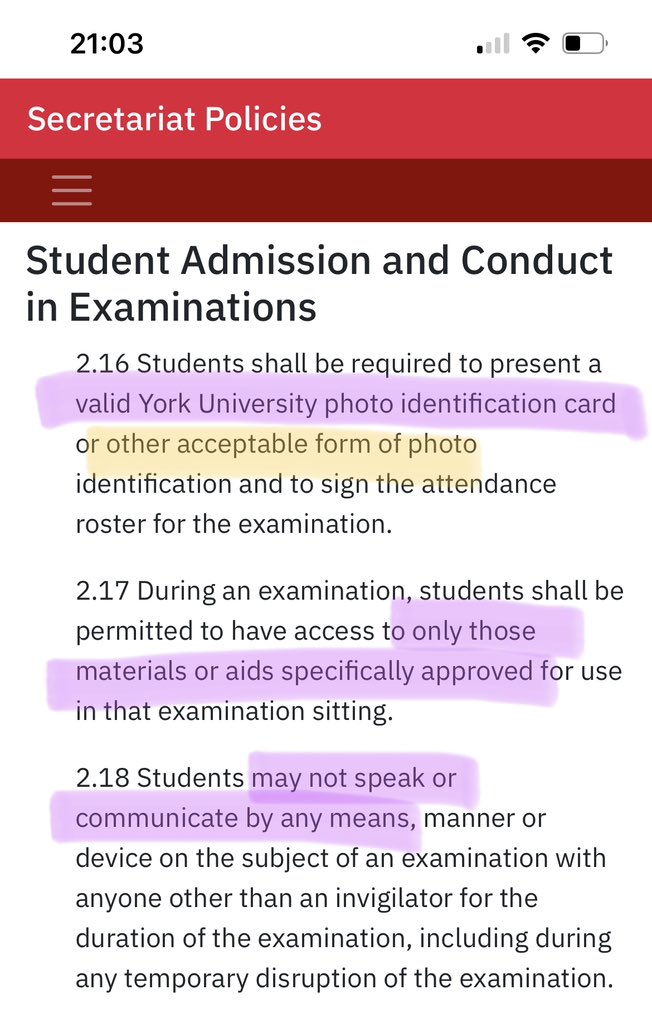On August 4, 2023 the YorkU community was told that just days earlier the whole University, including students, was no longer requiring physical identification cards:
"As of July 31, all incoming students to York University will receive their YU-card digitally"
By "digitally" we mean having identification information on a cell phone or "smart watch" similar, it seems, to Apple Pay. This move to "ID cards on a cell phone" was announced by our former head of Food Services and now Assistant Vice President of Ancillary Services, Tom Watt. And, from a food service perspective, I get why such a move would make sense. Tapping your phone to get a Starbucks coffee on campus is simple and convenient. It's also pretty whiz-bang cool to just tap your phone on things and get stuff in return.
But there's a problem. Well, in fact, few problems.
The first is that this move was made with what appears to be no consultation with the broader York University community. Was this move brought before our University's Senate? Were students consulted? How about professors? I don't recall any of this consultation happening.
Because, had professors been consulted, then the threat of cell phones in the exam context would have come up.
But more on that later. First, let's look at the little "CYA" statement at the end of the article that states:
"For those without a compatible smartphone, plastic cards will remain available at no cost through the YU-card office."
Great. So this has the appearance of fairness because the University can then state that it's not imposing cell phone ownership on students. But here's where the final exam issue starts to become apparent. In the FAQ for these "ID on cell phones" we're told that students have to choose between the phone and the physical card. They can't have both simultaneously:
"Every student and staff member can only have one credential at a time"
and that there's no fee only the first time the student chooses between card and phone. After that, there's a requirement to pay a "replacement fee" of $30 for switches between phone ID to physical card ID. And, because of this expensive "one or the other" requirement , we're going to have students showing up to final exams in December 2023 with a cell phone on hand (because that's all that's being issued as of July 31, 2023) demanding that faculty and our teaching assistants accept having a cell phone on their desks during a final exam.
Anyone who has invigilated an exam in the last twenty years knows how much students desire to have access to their phones during an exam and how difficult it is to stop them. And so, with this initiative, students will have, during a final exam, a mobile communication device, capable of:

- taking photos of the exam,
- feeding answers to them via in-ear bluetooth headphones,
- connecting to ChatGPT in real time
And there's apparently nothing, in practical terms, that the exam invigilators will to be able to do about it.
Now, I've been at York long enough to know that the very first thing that managers are going to do is to claim that issue is being overblown, that there's nothing to worry about. They'll claim that exam invigilators will be able to request that students put away their phones and smart watches after their IDs have been validated. My counter to that is that few if any of them have ever invigilated an exam with 400 or more students and that policing of cheating material is hard enough without having phones on or near the students for a University-approved reason.
(Of course, there's no word about how it is that invigilators will be able to validate the phone information. Do we get an app that allows us to tap our phones against student phones?)
And, then, there's another wrinkle. It turns out that faculty have an apparent ace up their sleeve: a Senate policy (right) that permits invigilators to ban "material or aids" during exams. So, what happens when a professor tells her class of 1000 biology students "you may not bring your cell phone to the final exam"? Well, I can see a whole lot of negative outcomes here, starting with students now having to scramble to obtain $30 plastic ID cards. Or being required to present government ID (like a driver's licence that they don't have because so many students don't drive).
But, of course, because of the consumer model of education that relies on biased student reviews of class and a large number of precariously-employed contract faculty, we're also likely to see a laissez-faire approach to cell phones in final exams. Why? Because sessional professors aren't paid enough or long enough to engage properly in academic misconduct affairs and too many professors are afraid of how messing with cell phones will negatively impact the student surveys that are connected to their tenure and promotion.
None of this is simple, in spite of the ubiquity and intuitiveness of modern cell phones in the student population.
It's true that over 99% of students are using their phones to access University services. This is a real number, one that comes directly from our University IT department, based on real data from the two-factor authentication system already in place. Cell phones are a real part of modern university life. I'm not against the use of devices like phones and smart watches at the University. In fact, I've spent the better part of the last two years fighting an up-hill battle to have structures put in place to encourage their proper use in an educational context (that'll be a blog post all on its own). Such initiatives should be faculty-driven, with input from staff and students. They need to take into account how classrooms, labs and final exams work. The impact on academic integrity cannot be overstated and relevant protections need to be put in place from the very beginning. I don't see any evidence for any of this being done with this "ID on a cell phone" initiative.
This did not happen in a vacuum. It appears to have followed the same staff- and management-led process that led to how two-factor authentication was introduced to the University. A similar process apparently drove how parking services went to a phone-only approach to parking payment at many lots across the University. A pattern is emerging and the direction this is going is clear: because mobile technology is so widely used outside of the University, we are going to have managers and staff members of the University continue to introduce systems and processes that rely on them inside the University. And it will be done in a manner that bypasses the collegial governance and collective agreement processes. It will leverage uncertainties due to the gaping holes in our outdated Senate policies -- policies which assume that the only technology used in contexts like exams are paper-based ("question sheets and answer booklets").
The "ID on cell phone" initiative needs to be stopped. The negative consequences are too obvious. A more careful, deliberate and collegially-driven set of policies, processes and supports are needed.

James Andrew Smith is a Professional Engineer and Associate Professor in the Electrical Engineering and Computer Science Department of York University's Lassonde School, with degrees in Electrical and Mechanical Engineering from the University of Alberta and McGill University. Previously a program director in biomedical engineering, his research background spans robotics, locomotion, human birth and engineering education. While on sabbatical in 2018-19 with his wife and kids he lived in Strasbourg, France and he taught at the INSA Strasbourg and Hochschule Karlsruhe and wrote about his personal and professional perspectives. James is a proponent of using social media to advocate for justice, equity, diversity and inclusion as well as evidence-based applications of research in the public sphere. You can find him on Twitter. Originally from Québec City, he now lives in Toronto, Canada.
